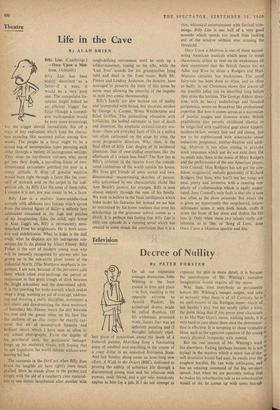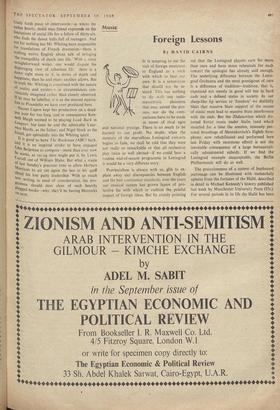Television
Decree of Nullity
By PETER FORSTER
OF all our important younger dramatists, John Whiting is the least rooted in time and place —in fact, standing at the opposite extreme to Arnold Wesker, his archetypal drama might be called Rootless. Of his ambitious, produced work, Saints Day was an infinitely puzzling and (I thought) infinitely repel- lent piece of symbolism about the death of a John-ish painter, Marching Song a fascinating piece of cerebral soul-searching in the course of a coup d'etat in an unnamed European State. And last Sunday along came an hour-long new effort, A Walk in the Desert (BBC), dedicated to proving the nullity of suburban life through a discontented young man and his relations with parents, male friend, and a girl who mistakenly applies to him for a job. If I do not attempt to expound the plot in more detail, it is because the convolutions of Mr. Whiting's narrative imagination would require all my space.
Why, then, does everybody so persistently lament Mr. Whiting's meagre output, and take so seriously what there is of it? Certainly he is no spell-weaver in the Rattigan sense—much of last Sunday's play was too nearly rather a bore, the point being that if you prove your characters to be like Peer Gynt's onion, nothing inside, it is 0 very hard to care about them once the demonstra- tion is effective. It is tempting to chase symbolic 4' ideas, such as the apparent equation of the young 4 man's physical incapacity with mental. But the real interest of Mr. Whiting's work • lies elsewhere. Failing (perhaps because he is not • trying) in the matters which a more run-of-the- mill dramatist would find easy, he excels over the • toughest hurdles. He can write soliloquies, and has an amazing command of the big set-piece speech. Just when we are peevishly noting that he makes his suburbanites talk as no suburbanites would or do, he comes up with some marvel. lously fresh piece ot observation—as where the rather hearty, stolid man friend expounds on the limitations of social life for a fellow of thirty-six, who finds the dance halls full of teenagers. And not for nothing has Mr. Whiting been responsible for translations of French dramatists—there is nothing native English about talk of bringing the tranquillity of death into life.' With a more straightforward writer. one would dispute his disparaging view of suburban life there is a damn• sight more to it. in terms of depth and happiness, than he and many another allows. But in truth Mr. Whiting is concerned with the nature of reality and existen.-e. in circumstances con- veniently imagined rather than closely observed. If he may be labelled, it is as the nearest equiva- lent to Pirandello we have ever produced here. Naomi Capon kept her production on a dead- Pan note for too long: and in consequence Ken- neth Haigh seemed to be playing Look Back in Languor, but later he and the admirable Laur- ence Hardy, as the father, and Nigel Stock as the friend, got splendidly into the Whiting spirit. It is good to have The Bookman (ABC) back, and it is an inspired stroke to have engaged f_nhn Betjeman as compere—more than ever now he seems, as racing men might put it, by Lewis Carroll out of William Blake. But what a waste of last Sunday's precious time to allow Herbert Morrison to air yet again the bee in his quiff about his lost party leadership. With so much new writing in need of consideration, the pro- gramme should steer clear of such heavily Plugged books—why, they'll be having Horrocks °n next.











































 Previous page
Previous page